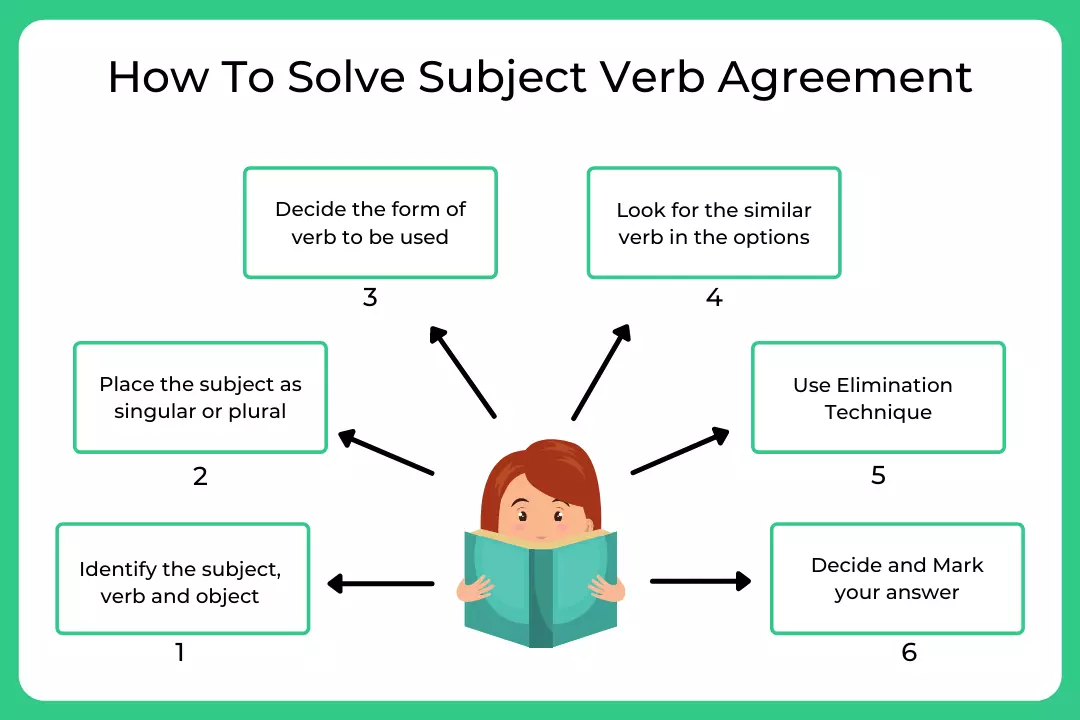Verbal Menu
- Basic Grammar
- Speech and Voices
- Tenses
- Articles
- Tenses and Articles
- Idioms and Phrases
- Subject Verb Agreement
- Prepositions and Conjunction
- Selecting Words
- Relative Pronoun
- Sentence Completion
- Sentence Ordering
- Contextual Vocabulary
- Jumbled Sentence
- Sentence Formation
- Error Identification
- Sentence Improvement and Construction
- Cloze Test
- Fill in the blanks
- Paragraph Ordering
- Para Jumbles
- Synonyms and Antonyms
- Synonyms
- Antonyms
- Reading Comprehension
- Get Off-campus Drive Updates
- Get Hiring Updates
- Contact US
PREPINSTA PRIME
How To Solve Subject-Verb Agreement Questions Quickly
How To Solve Subject Verb Agreement Quickly
If you want to know How to Solve Subject Verb Agreement then you are on the right page.
A Subject is said to be in Agreement with the Verb when the plurality of both is on the same terms. This means that a Singular Subject takes a Singular Verb and a Plural Subject takes a Plural Verb.

How To Solve Subject-Verb Agreement Quickly
A sentence is made up of two parts: Subject and Verb.
SUBJECT that tells us what the sentence is about. It can be either a noun (book, cars, Mary, etc)or a pronoun(they, she, etc). It can be either singular or plural.
VERB represents the action of a sentence (is, went, will place, have taken, etc)
How to make the subject and verb agree:
1-Identify the subject of the sentence.
2-Decide if the subject is singular or plural.
3-Lastly, decide which verb form will match the subject.
Below are some tricks or ways that can help you to solve Subject Verb Agreement efficiently
Trick 1
Collective nouns may take either a singular or a plural verb, depending on their use in the sentence.
Trick 2
Some words, such as news, measles, physics, etc. are extremely deceptive. They end in -s and appear to be plural but are really singular and require singular verbs.
Trick 3
After many/a great many/a good many, etc., the noun is always plural, which is followed by a plural verb.
Trick 4
Use a singular verb with distances, periods of time, sums of money, etc., when considered as a unit.
Trick 5
In sentences beginning with here or there, the true subject follows the verb.
Trick 6
Sometimes the subject is separated from the verb by such words as along with, as well as, besides, not, etc. These words and phrases are not part of the subject. Ignore them and use a singular verb when the subject is singular.
Trick 7
As a general rule, use a plural verb with two or more subjects when they are connected by and.
Trick 8
The verb in an or, either/or, or neither/nor sentence agrees with the noun or pronoun closest to it.
Prime Course Trailer
Related Banners
Get PrepInsta Prime & get Access to all 200+ courses offered by PrepInsta in One Subscription
Sample Questions
Question 1.
The cost of grocery these days ___ rose.
- Has
- Have
- Is
- Are
Correct Answer: A
Explanation:
The subject is singular that is a cost which is why “has” is the right answer.
Question 2.
He and his sister were carried by his father on his shoulders.
- His father carried his sister and him on his shoulders.
- On his father’s shoulders, he and his sister were carried.
- His father carried him and his sister on his shoulders.
- No change
Correct Sentence: A
Explanation:
The sentence is correct as the subject comes before the verb (father carried), also it uses “his sister and him” which is grammatically the right form.
Question 3.
Choose the right sentence:
- Each one of the pants have a pocket.
- Each one of the pants has a pocket
Correct Answer: B
Explanation:
‘Each one’ is an appositive that always takes singular form with it. Therefore, has is the correct choice.
Question 4.
Identify the error in the sentence:
This artist, along with some other, plays the guitar on stage.
- This artist
- Along with
- Other
- Plays
Correct Answer: C
Explanation:
The subject does not agree with the verb here as the sentence use ‘along with’ where “others” should be used instead of “other.”
Also Check Out
Get over 200+ course One Subscription
Courses like AI/ML, Cloud Computing, Ethical Hacking, C, C++, Java, Python, DSA (All Languages), Competitive Coding (All Languages), TCS, Infosys, Wipro, Amazon, DBMS, SQL and others
- Basic Grammar – Questions | Rules | How to Solve Quickly | Tricks & Shortcuts
- Speech and Voices – Questions | Rules | How to Solve Quickly | Tricks & Shortcuts
- Tenses – Questions | Rules | How to Solve Quickly | Tricks & Shortcuts
- Articles – Questions | Rules | How to Solve Quickly | Tricks & Shortcuts
- Tenses and Articles – Questions | Rules | How to Solve Quickly | Tricks & Shortcuts
- Idioms and Phrases – Questions | Rules | How to Solve Quickly | Tricks & Shortcuts
- Prepositions and Conjunction – Questions | Rules | How to Solve Quickly | Tricks & Shortcuts
- Selecting Words – Questions | Rules | How to Solve Quickly | Tricks & Shortcuts
- Relative Pronoun – Questions | Rules | How to Solve Quickly | Tricks & Shortcuts
- Sentence Completion- Questions | Rules | How to Solve Quickly | Tricks & Shortcuts
- Basic Grammar – Questions |
Rules |
How to Solve Quickly |
Tricks & Shortcuts - Speech and Voices – Questions |
Rules |
How to Solve Quickly |
Tricks & Shortcuts - Tenses – Questions |
Rules |
How to Solve Quickly |
Tricks & Shortcuts - Articles – Questions |
Rules |
How to Solve Quickly |
Tricks & Shortcuts - Tenses and Articles – Questions |
Rules |
How to Solve Quickly |
Tricks & Shortcuts - Idioms and Phrases – Questions |
Rules |
How to Solve Quickly |
Tricks & Shortcuts - Prepositions and Conjunction –
Questions |
Rules |
How to Solve Quickly |
Tricks & Shortcuts - Selecting Words – Questions |
Rules |
How to Solve Quickly |
Tricks & Shortcuts - Relative Pronoun – Questions |
Rules |
How to Solve Quickly |
Tricks & Shortcuts - Sentence Completion- Questions |
Rules |
How to Solve Quickly |
Tricks & Shortcuts

 Apply For Jobs
Apply For Jobs Get Hiring Updates
Get Hiring Updates




Login/Signup to comment